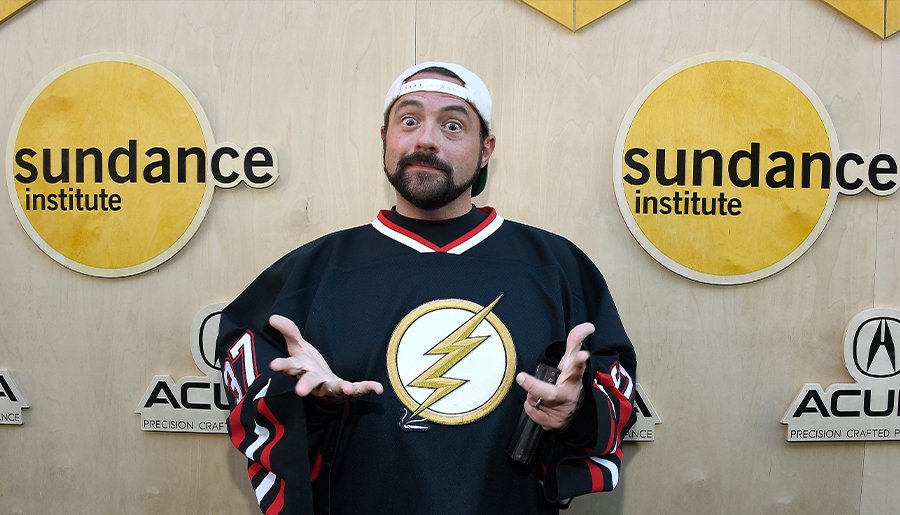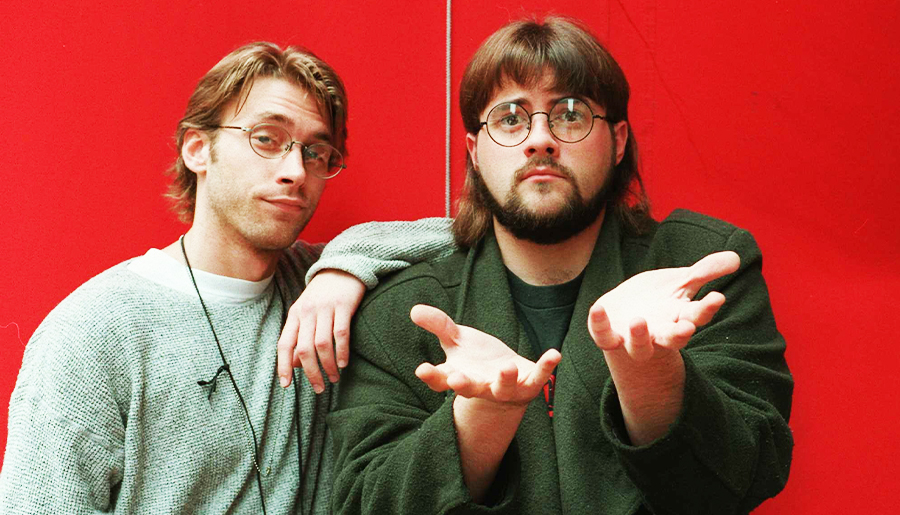At some point in the last 24 hours, the director Kevin Smith has talked about his 1994 film Clerks. What’s more, he’ll talk about Clerks tomorrow. And he’ll talk about Clerks the day after that.
In a 2022 interview with the comedian Pete Holmes, Smith said, “I’m still eating up Clerks. I talk about Clerks 28 times each day.”
Likewise, in a 2021 interview with ScreenRant, Smith stated, “Christopher Nolan is a futurist. When was the last time he mentioned Momento? One of the greatest films ever made. But he doesn’t have to talk about it, because he’s talking about what he’s making next… I’m very comfy talking about the past.”

However, Smith’s obsession with Clerks makes sense. Smith bet his life savings on this film. In 1994, Smith used 10 credit cards in order to fund the production of Clerks. If Smith’s film didn’t make its money back, then he would’ve landed himself in $27,000 worth of debt.
Fortunately for Smith, this gamble paid off. Not only did Clerks make over US $3,000,000 at the box office, it was adored by both critics and patrons alike. Since then, Clerks has solidified itself as a cultural classic. In 2019, it was even added to the Library of Congress’ National Film Registry.
Yet, while Clerks was beloved upon its release, 1994 is a very long time ago. As of January 31, 2024, this film is having its 30th year anniversary. In the past 30 years, Clerks might have aged like the finest of wines. It also may have soured into vinegar.
Which begs the question: Does Clerks hold up in 2024? A question that can only be answered in the next 11 months, a question we’ll answer right now.
What Is Clerks All About?
Clerks is a black-and-white film that centres on Dante, performed by Brian O’Halloran. Dante is a Quick Stop worker trapped in 1990s New Jersey. For the duration of this film, Dante hardly performs his convenience store duties. Dante hardly does much for that matter. Instead of serving his customers, he vibes at a nearby video store with his mate Randal, performed by Jeff Anderson. The pair kill their respective hours by discussing pop culture and talking about their love lives.
In the mid-nineties, Clerks wasn’t praised for having an exemplary plot. Instead, Clerks was praised for its grounded characters and Gen X dialogue. At the time, not many films were depicting the listless apathy that made the MTV bingers different from the boomers before them. Not many films openly referenced properties like Star Wars and Jaws.
Two historic reviewers who praised Smith’s dialogue were Roger Ebert and Derek Malcolm. Ebert was particularly impressed with how Smith folded his life experiences into his art.
“Quentin Tarantino has become famous as a video store clerk who watched all the movies in his store and then directed Reservoir Dogs and Pulp Fiction. Kevin Smith has done him one better, by working behind the counter and then making a movie about the store itself,” Ebert said. “Within the limitations of his bare-bones production, Smith shows great invention, a natural feel for human comedy, and a knack for writing weird, sometimes brilliant, dialogue.”
Likewise, Malcolm stated, “Where Tarantino’s characters are pulp fiction approximations rather than real people, both Dante and his friend Randal seem New Jersey denizens to a tee.”
However, while the dialogue of Clerks was novel in 1994, have these lines survived the test of time? Well, now that the novelty of creating pop culture-centric dialogue has worn off, a lot of this film’s lines tragically fall flat.
Take for instance, Dante and Randal’s Star Wars banter. In Clerks, these boys question what ideologies the Sith’s Empire and Jedi’s rebellion ascribe to.
“The Empire was a fascist theocracy, and the rebel forces were therefore battling religious persecution,” Randal said. “The only problem is that at no point in this series did I ever hear Leia or any of the Rebels declare a particular religious belief.”
In 2024, this dialogue feels stilted and flat. These lines don’t feel like they came from the noggin of some 20-year-old slacker, they feel like they were lifted straight from the first draft of a thesis. Randal’s diatribe felt fresh in 1994, but at the time, such pop culture dialogue was innovative. And unfortunately for Smith, innovative isn’t synonymous with good.
Credit Where Credit’s Due
While Clerks’ dialogue doesn’t hold up in 2024, that doesn’t mean it’s worthless. Kevin Smith’s Clerks walked so that modern cinema could run.
If Smith didn’t attempt to capture the magic of his generation’s vernacular, we wouldn’t have Juno. We wouldn’t have Eighth Grade or Superbad. We wouldn’t have Lady Bird, and what a catastrophe that would be.
An example of Smith’s influence on such films can be clearly demonstrated in Greg Mottola’s Superbad. During the runtime of this film, the audience is introduced to a pair of slacker cops, Officer Slater, performed by Bill Hader, and Officer Michaels, performed by Seth Rogen. Like a plethora of real law enforcers, these two would rather talk trash than do their jobs properly.
In the scene where Slater introduces Michaels, Slater reveals his disposition for being unprofessional, saying, “Michael’s here, he’s six months in. He’s young, but the Force is strong with this one. Learning you are, young padawan… That’s Yoda. Are you familiar with Yoda?”
The way that Slater breaks from his impression of Yoda to explain it is both hilarious and naturalistic. Not only is this reference far more grounded than the one Smith provides us with, it reveals that Mottola doesn’t think highly of some cops.
However, Clerks was released in 1994, while Superbad debuted in 2007. In the intervening years between these two films, many a director scored a chance to hone what Smith had kicked off.
Clerks and the YouTube Generation
As previously noted, the dialogue of Clerks attempts to be down-to-earth. What’s more, the same critique can be levied at Kevin Smith’s cinematography. For Clerks is defined by its utilitarian ambitions. It’s black and white because Kevin Smith couldn’t afford a colour camera. The blocking of each scene is flat, TV-esque. Rarely does Clerks have an artistic flare that defined the likes of 1990s Quentin Tarantino.
However, by being so entrenched in the raw fundamentals, Clerks proves that anybody can make a film. You don’t need a multi-million dollar budget. You don’t need to write a thesis on film theory. Sometimes all you have to do is turn on the camera and go.
This approach to filmmaking is now incredibly commonplace across the internet. On YouTube, filmmakers like Joel Haver have employed this “just rip it” approach. This can be demonstrated in Haver’s film A Simple Smash and Bash Job Gone Wrong, a feature-length improvised movie that was shot in its entirety during the Oscars’ 2021 broadcast.
In a similar vein to Clerks, Haver’s film doesn’t employ a pantheon of filmmaking techniques. Yet, by keeping the camera shots simple, Haver is able to let his improvisation skills shine. By employing a Smith-like approach, Haver was able to create a hilarious police procedural in less than four hours time.
Smith’s filmmaking approach is also present in RedLetterMedia’s Half in the Bag series. In Half in the Bag, two VCR repairmen named Mike Stoklasa and Jay Bauman scam their customers by discussing modern movies while on the job. Like Clerks, it’s shot super flat. Like Clerks, it’s super successful, often scoring millions of views.
Now, if Clerks didn’t exist, would Haver and RedLetterMedia be creating such works? Maybe. It’s possible that as film equipment dropped in price that another filmmaker would’ve stepped up to this plate. However, Smith put his finances on the line before this moment came. By successfully taking a leap, Smith became a cornerstone of modern cinema. And for that, we should pay him his dues.
Clerks: A 30th Year Conclusion
Some artworks are revolutionary yet don’t stand the test of time. Take for instance, The Arrival of a Train at La Ciotat Station, that 50-second silent film of a train driving towards a camera. Should we acknowledge that it transformed cinema? Most certainly. Should we play it on repeat during a movie night with our mates? Perhaps not.
It’s been 30 years since Clerks was first released. In the intervening years, this film has become the Gen X version of The Arrival of a Train at La Ciotat Station. In a void, it doesn’t hold up, in the proper context, it’s legendary.
Related: The $20,000 Reason That ‘Our Flag Means Death’ Might Score a Resurrection
Related: From YouTube to Hollywood — How Abigail Thorn Is Changing the Film Industry
Read more stories from The Latch and subscribe to our email newsletter.

